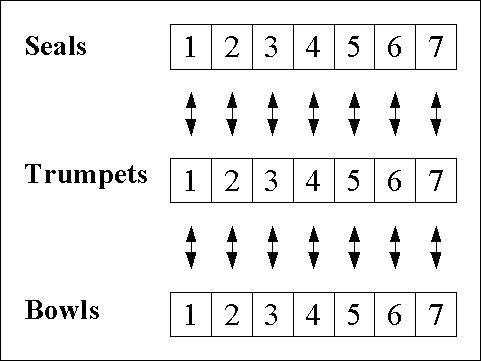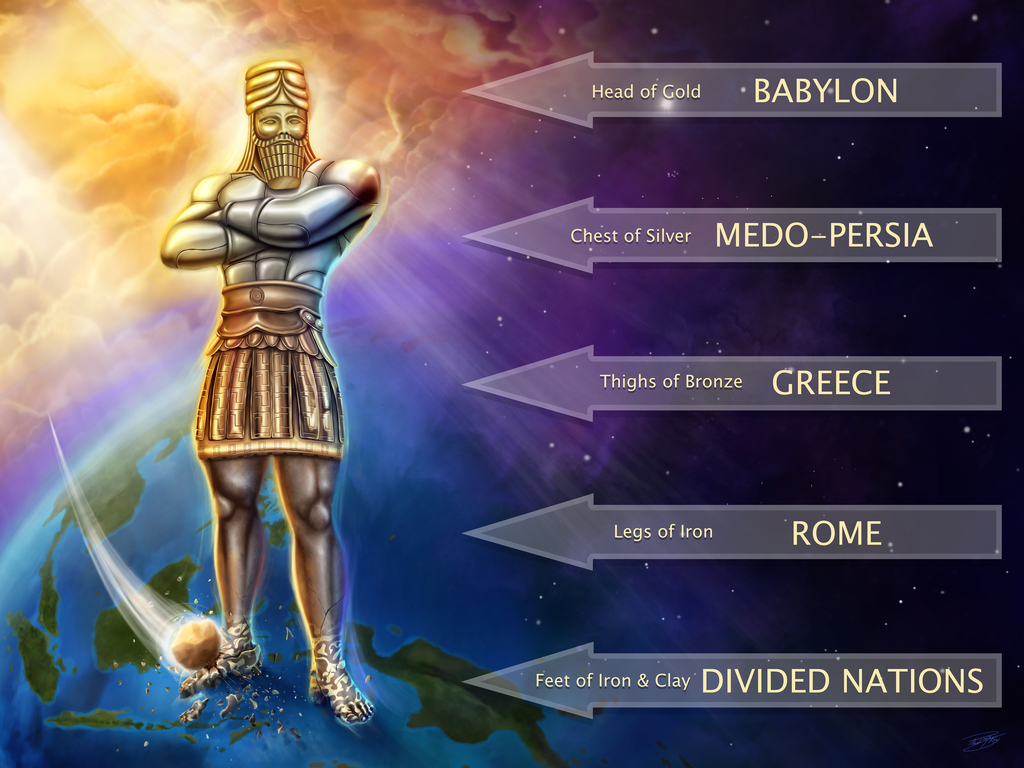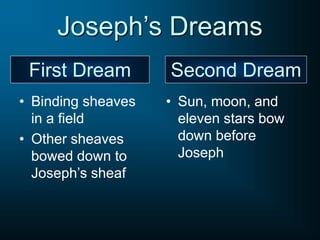Linear
OR
Recapitulation?
Are the events and happenings that occur in the book of Revelation when each of the seven seals of the scroll are opened (chapter five) the same events that occur when the seven angels blow their trumpets, or when the seven bowls of wrath are poured out? Are the events occurring under the opening of the first seal the same events occurring under the first trumpet and first bowl? If you say yes, then you believe that each cycle of seals, trumpets, and bowls recapitulates the same events or time period. The fact that they are described differently, however, seems to show otherwise. Those who hold to this recapitulation theory will say that though described differently they are still describing the same event. It is like many people seeing an event (like the assassination of John Kennedy for instance) and are agreed on certain things they saw and yet saw some things that others did not, for they were looking at what occurred from a different vantage point or perspective.
The above two charts describe each view. The chronological view is shown first and shows how the things of the seven trumpets are what transpires under the seventh seal, being a part of it, and is not a part of the preceding six seals. Likewise, the seven bowls are part of the seventh trumpet, and therefore part of the occurrences of the seventh seal.
The recapulation view says that the seals, trumpets, and bowls are a repeat, with new details added. In other words, for example, what takes place under the first seal is what takes place under the first trumpet and first bowl. That is simply untenable.
Under "Literary Structure" the editor or administration of the website Precept Austin (See here) has this to say about the two different views about the chronology of things in the Book of Revelation:
"Are the seals, trumpets, and bowls sequential? Or do similarities between some of them imply the different passages are describing different details concerning the same event (repetition or recapitulation)? This process is complicated by the wide variety of conclusions interpreters reach concerning the literary structure of the book."
In my mind the things that occur in the book of Revelation occur linearly or chronologically and are not a series of recapitulations. In fact, I am bewildered as to how anyone could take that view when he looks at the book at face value and gives it a normal interpretation. The recapitulation view to me has no legs to stand on.
Said the same source:
"Although there are many different views concerning the structure of the book of Revelation, two primary views have been recognized: the sequential view and the simultaneous or recapitulation view. Most other views are a variation on one of these."
I am a firm believer in the sequential or chronological view. That is the plain reading of the text. And, once we begin to depart from that truth, we create all kinds of theological problems. For instance, the millennium of chapter twenty follows the second coming of Christ in chapter nineteen and the new heavens and earth of chapter twenty one follow both the second coming and the millennium. But, if there is no chronology to the events of the Apocalypse, then we could change this order.
Said the same source:
"The main weakness of the recapitulation view is that it emphasizes similarity between passages over distinct differences which remain. But, similarity does not equal identity. Those who believe that details are intentionally revealed in the text for the reader to notice are unlikely to embrace the recapitulation view because it glosses over these differences."
Exactly. And, if anyone studies the events of the seven trumpets and seven bowls, then he will see that those events are clearly not the same events of the seven seals.
Citing others the same writing says:
"The sequential view understands the general flow of the book and especially the series of seal, trumpet, and bowl judgments as following a chronological sequence. Similarities between different chronological judgments are understood as part of God’s design, but not necessitating identity because differences in the text make plain that identity is not involved. In the most widely-held sequential view, the events attending the seven bowls are subsumed within the seventh trumpet and the events of the seven trumpets are subsumed within the seventh seal."
That is what the chart at the heading of this posting portray and what I firmly believe is the plain reading of the text. Those who deny the sequential view seem to do so because of a bias, and this bias is predominant among Amillennialists.
Citing others the same writing says:
"The more literal one’s interpretation, the more one will tend to follow the sequential view. The more one emphasizes literary genre and symbolism and moves further afield from the Golden Rule of Interpretation, the more likely the recapitulation structure or other literary structure will find appeal. While the sequential view holds the basic flow of the book to be chronological, it does not preclude recapitulation in some of the related visionary scenes which are not strongly anchored within the sequence."
Again, this is so true. Those who want to spiritualize prophecy, such as do the Amillennialists, are the ones who promote the recapitulation view. My response to them doing this is to ask "why they feel a need to do it?" There is nothing in the prophecy of the Apocalypse to indicate that it is circular, and everything points to the sequential or chronological view, so why they do this is kind of a mystery. I think part of the reason is that they want to take very little of the prophecy of the Apocalypse literally, often saying such things as "the book of Revelation is all symbolic," or it is all "apocalyptic and so all symbolic," etc. But, most prophecies are very literal, and the ones that make use of symbols use such symbols as are clearly understood or explained by the prophet and the symbols stand in the place of what is literal.
Citing others the same writing says:
"Although there are many similarities between the septets, the differences are more crucial and determinative. The seals generally differ in content from the trumpet and bowl plagues. There is no parallel alignment between the first, fifth, and seventh judgments of the septets. . .The two Greek phrases καὶ εἶδον [kai eidon] and μετὰ ταῦτα [meta tauta] indicate a sequential movement . . .a chronological movement . . .The seven seals are followed by the seven trumpets, and the seven bowls follow the seven trumpets. . .The bowls evidence a sequential pattern as they are called “the last, because in them the wrath of God is finished” (Rev. 15:1+). . .The seventh trumpet is linked to the seven bowls."
As others have pointed out, the seven trumpets are what occurs during the time of the seventh seal's opening and what occurs during the time of the seventh trumpet are the seven vials. Ergo, all that occurs under the sounding of the seven trumpets, and during the pouring out of the seven vials, all occur under the opening of the seventh seal.
There are numerous time markers in the book of Revelation that show that things are occurring in a sequence, like dominoes falling.
Citing others the same writing says:
"When the seventh seal is opened (Rev. 8:1-5+), no immediate events as such follow on earth—except for the earthquake—as in the first six seals, unless the opening of the seventh seal includes among its events the blowing of the seven trumpets of judgment (Rev. 8:6+-11:15+). This appears to be precisely the case. . . . The seventh trumpet likewise is not immediately followed by any specific events on earth (Rev. 11:15+ff.), except for an earthquake and a hailstorm (Rev. 11:19+). However, just before the seventh trumpet is sounded, we read, “The second woe has passed; the third woe is coming soon” (Rev. 11:14+). When the seven angels prepare to pour out “the seven last plagues,” symbolized by the bowls, we read that with these bowls “God’s wrath is completed” (Rev. 15:1+, 7+). Thus it seems reasonable to identify the content of the seventh trumpet with the seven bowls of judgment (Rev. 16+-19+)."
I firmly believe what this writer says. Notice the order. This is first, this is second, this is third, etc. This is the tenor and syntax of the book. It is a prophetic book ("words of the prophecy of this book" - Rev. 22: 18) and when foretelling events the prophets tell us how and when things will occur, and this involves chronology.
Citing others the same writing says:
"Another reason why the bowl judgments cannot represent a recapitulation of the previous trumpet or seal judgments is found in the difference in access to the heavenly Temple during the period of the judgments. Due to the great significance of the final bowl judgments, the heavenly Temple is closed for their duration (Rev. 15:8+). Yet in the midst of the seal and trumpet judgments, the Temple is not sealed (Rev. 7:15+; 11:19+; 14:15+, 17+; 15:6+). This indicates that the bowl judgments (Rev. 16+) cannot be merely descriptive of further detail related to the corresponding trumpet or seal judgments, but are unique in themselves and must occur at an entirely different period of time which follows upon the opening of the seals and sounding of the trumpets."
Another good argument against the circular or recapitulation view and for the chronological view!
Citing others the same writing says:
"One of the frequently-heard criticisms of the sequential view is that it lacks sensitivity to the literary form or apocalyptic genre of the book. As the reader recognizes by now, the single largest factor which divides interpreters of the book is how literal one takes its contents. Whenever literary genre, apocalyptic similarities, and devotional qualities are elevated in importance over a literal interpretation, the result will most likely be non-futurist and embrace significant recapitulation. By adopting a recapitulation view, it can be argued that one of the key values of the book of Revelation is forfeited, its guidance in organizing related passages:
The value of the book of Revelation is not that it provides a lot of new information, but rather that it takes the scattered Old Testament prophecies and puts them in chronological order so that the sequence of events may be determined. . . .This is the reason for so many references to the Old Testament."
I believe these things very strongly. I hope the reader can see the truth on this. We will have another chapter to finish this short series.







